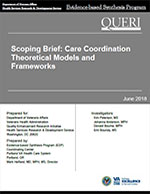
Prepared by:
Evidence-based Synthesis Program (ESP) Coordinating Center,
Portland VA Health Care System,
Portland, OR
Mark Helfand, MD, MPH, MS, Director
Recommended citation:
Peterson K, Anderson J, Bourne D, Boundy E. Scoping Brief: Care Coordination Theoretical Models and Frameworks. VA ESP Project #09-199; 2018.
Download PDF: Brief, Full Data Table, Supplemental Materials
Clinical care of patients with multiple, complex, chronic conditions often requires input from multiple providers from a variety of clinical disciplines and social services. Lack of deliberate organization, cooperation, and sharing of information amongst patients and providers can lead to fragmented care, which can jeopardize the effectiveness, safety, and efficiency of health care delivery. Care coordination strategies are of great interest as they have the potential to improve quality of care, efficiency, and patient outcomes. Many theoretical frameworks exist to guide providers and researchers in improving and evaluating care coordination. However, understanding and use of these frameworks is currently limited by their complexity and wide variability in factors such as their foundation, structure, target population(s), main components, mechanisms, and the health system levels they address. Understanding of existing care coordination theoretical models and conceptual frameworks is important in developing measures and addressing research gaps.
Key Question 1: What are the theoretical models and conceptual frameworks for guiding practitioners in coordinating care in research or practice, and what are their key characteristics?
Key Question 2: What are the theoretical models and conceptual frameworks for guiding practitioners in evaluating care coordination in research or practice, and what are their key characteristics?
Key Question 3: Among those theoretical models/frameworks identified, which have been the most influential?
Peterson K, Anderson J, Bourne D, et al. Health Care Coordination Theoretical Frameworks: A Systematic Scoping Review to Increase Their Understanding and Use in Practice. Journal of General Internal Medicine. Published online May 21, 2019. DOI: 10.1007/s11606-019-04966-z.